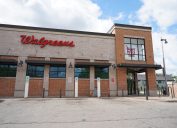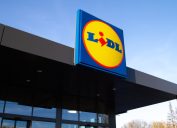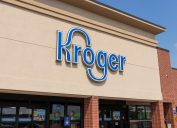Kroger and Albertsons Are Abandoning Over 400 Locations, Starting Now
The two companies are planning to offload stores as part of a massive merger.
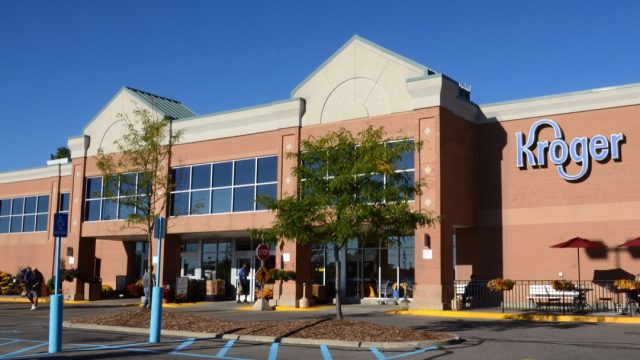
Store closures have become a constant threat to customers over the past few years. From home decor stores to pharmacy chains, retailers have been shutting down locations left and right. Now, two of the largest supermarket chains in the U.S. are planning to offload hundreds of grocery stores as part of a massive merger plan, meaning more closures could be on the way. Read on to discover why Kroger and Albertsons are abandoning over 400 locations.
RELATED: Kroger Shoppers Threaten to Boycott Over Self-Checkout.
Kroger and Albertsons have been working on a merger.
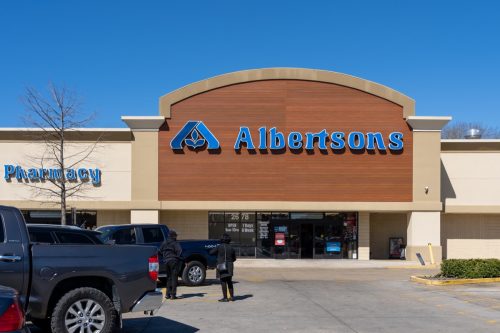
A major grocery merger is on the horizon. Last October, Kroger announced plans to buy Albertsons for nearly $25 million, CNN reported. The deal is set to combine two of the biggest supermarket companies in the U.S. and result in one of the largest mergers in the country's history. Together, these companies operate dozens of grocery chains. Kroger owns chains that include Ralphs, Harris Teeter, Dillons, and Fred Meyer, while Albertsons owns Safeway and Vons.
"We are bringing together two purpose-driven organizations to deliver superior value to customers, associates, communities and shareholders," Rodney McMullen, Kroger chairman and CEO, said in a statement at the time. "Albertsons Cos. brings a complementary footprint and operates in several parts of the country with very few or no Kroger stores … As a combined entity, we will be better positioned to advance Kroger's successful go-to-market strategy by providing an incredible seamless shopping experience, expanding Our Brands portfolio, and delivering personalized value and savings."
RELATED: Kroger Store Ditches Cashiers for Self-Checkout Only—Will More Follow?
The companies need to get rid of some stores to earn antitrust approval.

Kroger and Albertsons are expecting to complete their merger in 2024, and the two companies have said they believe they have a "clear path" to gain federal approval, CNN reported.
"We expect to make store divestitures in certain areas, and we will work cooperatively with the Federal Trade Commission (FTC) to obtain clearance for the transaction," Kroger finance chief Gary Millerchip said on a call with analysts in Oct. 2022, per CNN.
In other words, the companies are planning to offload hundreds of stores to win approval from antitrust regulators. The FTC utilizes antitrust laws to "promote vigorous competition and protect consumers from anticompetitive mergers and business practices," according to its website.
Before divestitures, Kroger and Albertsons would have a combined 710,000 workers and nearly 5,000 stores when merged. The companies are hoping to ease concerns about their potential control over the grocery market by selling off certain locations to competitors.
RELATED: Grocery Chains, Including Walmart, Are Closing Stores.
They've just agreed to sell over 400 locations.
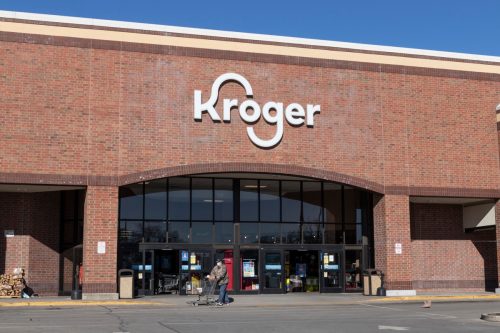
In a Sept. 8 press release, the two companies announced their new divestiture plan, which will include the "sale of select stores, banners, distribution centers, offices and private label brands" to C&S Wholesale Grocers, LLC.
C&S is another grocery retailer, which currently operates the Grand Union and Piggly Wiggly chains. According to the release, the company is set to pay Kroger and Albertsons $1.9 billion for 413 stores, eight distribution centers, two offices, and five private label brands.
"Following the announcement of our proposed merger with Albertsons Cos., we embarked on a robust and thoughtful process to identify a well-capitalized buyer who will operate as a fierce competitor and ensure divested stores and their associates will continue serving their communities in the ways they do today," McMullen said in a statement accompanying the release. "C&S achieves all these objectives."
RELATED: 6 Secrets Kroger Doesn't Want You to Know.
Grocery stores in 17 different states will be impacted.
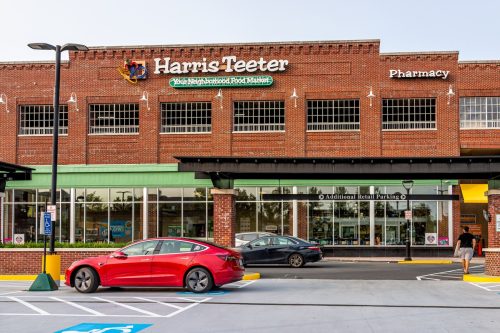
The 413 locations will come from across the U.S., according to the release. In total, Kroger and Albertsons are planning to sell hundreds of stores in 17 states and Washington, D.C. The companies have not yet released information on exactly which locations will be sold to C&S, but they have indicated how many will be sold in each state.
As part of the new divestiture plan, they will sell 14 Albertsons stores in Alaska; 24 Albertsons stores in Arizona; 66 Albertsons and Kroger stores in California; 52 Albertsons stores in Colorado; 10 Harris Teeter stores in D.C., Maryland, and Virginia; 13 Albertsons stores in Idaho; 14 Kroger stores in Illinois; 12 Albertsons stores in Montana, Utah, and Wyoming; 15 Albertsons stores in Nevada; 12 Albertsons stores in New Mexico; 49 Albertsons and Kroger stores in Oregon; 28 Albertsons stores in Texas and Louisiana; and 104 Albertsons and Kroger stores in Washington.
RELATED: 5 Secrets Albertsons Doesn't Want You to Know.
People are worried about potential closures.
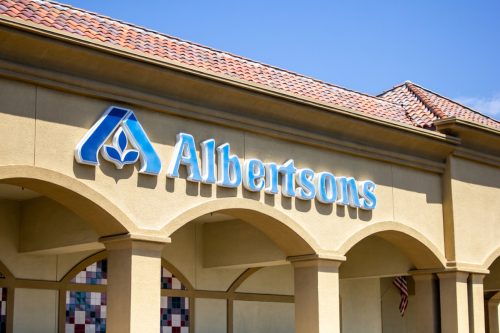
Amid opposition from consumer and union groups, Kroger and Albertsons have steadily vowed not to lay off workers or close any stores as a result of their plans to merger. The decision to sell 413 locations to C&S also backs up this promise, according to the companies.
"The divestiture plan ensures no stores will close as a result of the merger and that all frontline associates will remain employed," the press release stated.
But some people are still skeptical. Christine Martinez told CNN that she lost her job as a pharmacy technician when a similar divestiture plan was put in place during Albertsons' merger with Safeway in 2014. Martinez was working for a subsidiary of Safeway in Valencia, California, at the time, but it was one of the 146 former Albertsons and Safeway stores bought by a small chain called Haggen to earn approval from antitrust regulators.
According to Martinez, Haggen overhauled her entire store, raised prices, cut hours, and laid off employees. Eventually, the store closed entirely—and it wasn't the only one. Less than a year later, Haggen filed for bankruptcy and closed more locations, according to CNN.
Now, Martinez is worried that the Kroger-Albertson merger will have a similar impact and affect her new job as a pharmacy technician at a Ralphs supermarket, which is owned by Kroger.
"It brought back a lot of fear and anxiety," she told the news outlet. "My co-workers are feeling anxious. They're hearing that Kroger is going to have to divest. Everyone is worried it will be their store."
RELATED: For more up-to-date information, sign up for our daily newsletter.
